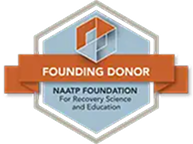Does Virtual Addiction Treatment Really Work? Consider These 5 Benefits

With the increasing availability of virtual programming, many individuals in recovery have more options than ever for support — yet it’s understandable that virtual options are still viewed with some amount of skepticism, especially in the realm of relapse prevention.
After all, how can a Zoom call compare to the real deal? While research in this area is still emerging, a systematic review conducted in 2020, reviewing over 22 different studies, affirmed that telemedicine shows considerable promise for reducing alcohol consumption and supporting those in recovery. Since both the technology and clinicians utilizing it have only advanced in the last five years, it’s not a stretch to say that the quality of care being received in virtual settings is only improving.
However, it doesn’t take a research team to notice the unique benefits of virtual care, including recovery groups like virtual 12-step meetings and virtual IOP (intensive outpatient programs). In this article, we’ll be highlighting how virtual groups are uniquely designed to support recovery and prevent relapse for those struggling with substance use.
1. Flexibility: Support When You Need It Most
One of the challenges of recovery is making intentional time for the support that keeps us on track.
In the faster pace of daily life, especially when we return to work or family responsibilities after treatment, recovery can fade into the backdrop of our lives, making slips more likely as the early warning signs of relapse escape our scattered attention.
Virtual groups are uniquely adaptable and more able to fit into our schedules, as they remove commute time, the need to coordinate transportation or child care, and offer a greater range of options to working professionals, parents, and even night owls. With more flexibility, you can set up a support system that is ramped up during difficult life transitions or events, while scaling it back when life feels more manageable.
2. Accessibility: Easier Access Means More Consistency
Being able to access support that isn’t tied to a specific physical location can not only open up a wider range of options to you, but it also makes that support easier to show up for.
Virtual care generally requires less energy to show up for, removes access barriers like travel and weather, and allows you to curate your environment to be more supportive of your needs and emotional state (think: comfort items, candles, and even pets!). If you have a disability, many virtual platforms now offer accommodations like closed captioning and chat features that make participation more possible.
In the 12-step world, we often end meetings by saying, “Keep coming back!” It’s not just a cutesy phrase — consistency is part of the foundation not only for sobriety, but for living a more connected and supported life.
3. Integration: Bringing Recovery Into Your ‘Real Life’
Recovery doesn’t happen in a bubble, though in-person intensive outpatient, partial hospitalization, and/or rehab can certainly feel that way. Part of what makes in-person rehab and other intensive programs challenging is that they often take place in detached environments that can feel separate from where we live, work, and play.
As such, the skills we build in treatment can feel untested and separate from the lives we’re waiting to return to. On the other hand, virtual groups allow you to build skills and confront challenges right in the midst of your “real life.” Being able to call in from a private space in your home, workplace, or community is a unique opportunity to integrate the work of recovery into every aspect of your life. By continuing to navigate triggers and unpack behaviors in the very settings where they arise, virtual groups can be a uniquely supportive bridge between intensive care and daily life.
This supported integration can be a hugely protective factor in preventing relapse.
4. Vulnerability: Showing Up As You Are
For individuals who may be socially anxious, neurodivergent, or otherwise more withdrawn in social settings, a virtual support environment can actually be a transformative experience. Oftentimes, we get out of recovery what we put in — but if we’re holding back in the spaces that are designed to help us heal, we may not get the full benefits that we need and deserve. Some people actually find that virtual environments, because they feel more contained and less exposed, allow them to show up with more vulnerability, honesty, and capacity.
If you are someone who finds in-person experiences to be overwhelming or overstimulating, you may discover that virtual support is the perfect balance of focused and intentional care, while allowing you to practice self-care and engage in ways that meet you where you are.
5. Personalization: Match Your Support to Your Exact Needs
When you’re in a position of needing additional support, but not needing something as structured and clinical, it can be challenging to find care that meets your specific needs and situation. For example, if you haven’t relapsed but you feel more vulnerable, attending a program where close medical monitoring is required may feel more intrusive to you than it does a supportive measure for accountability and safety.
Alternatively, you may have recently left a higher level of care, like rehab or partial hospitalization, and are looking for transitional support that allows you to gently step back into the chaos of daily life. The reality is, matching someone’s level of support to where they are in their journey is an important part of ensuring their success. Thankfully, there are a wider variety of virtual care options that can provide a stable base of support that is more fitting for someone who is at a different place in their journey.
Virtual intensive outpatient (IOP) is often a great middleground, particularly for a self-motivated individual who needs some amount of consistency, structure, and therapeutic guidance, but a higher degree of flexibility and integration that’s compatible with their daily life. And remember, there’s nothing wrong with needing more or less intensive support! The key is focusing on what best serves your recovery in this season of your life, without judging where you think you “should” be.
Looking for a Virtual IOP Option For Recovery?
At Fellowship Hall, we offer a Virtual Intensive Outpatient Program (IOP) that’s designed to support your sobriety, while creating a personalized plan for anticipating and preventing relapse in the future. Under the guidance of trained clinicians and compassionate providers, we help clients build skills in resilience and coping, while making recovery a foundational part of their daily lives.
→ View all of our outpatient support options, including virtual IOP and our early recovery group.
Contact our admissions team at (336) 553-6596 for more information. We’re here to help!
CONNECT WITH US
Our Admissions Staff Is Here to Help
Not sure if you or someone you love needs help? Call our Admissions Staff who can help you assess the next step at 336-553-6596."*" indicates required fields






